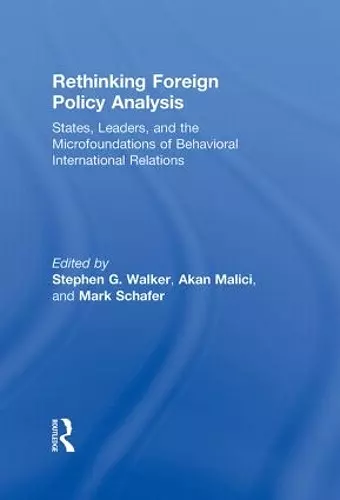Rethinking Foreign Policy Analysis
States, Leaders, and the Microfoundations of Behavioral International Relations
Akan Malici editor Stephen G Walker editor Mark Schafer editor
Format:Hardback
Publisher:Taylor & Francis Ltd
Published:8th Dec '10
Currently unavailable, and unfortunately no date known when it will be back
This hardback is available in another edition too:
- Paperback£49.99(9780415886987)

Stephen G. Walker, Akan Malici, and Mark Schafer present a definitive, social-psychological approach to integrating theories of foreign policy analysis and international relations—addressing the agent-centered, micro-political study of decisions by leaders and the structure-oriented, macro-political study of state interactions as a complex adaptive system. The links between the internal world of beliefs and the external world of events provide the strategic setting in which states collide and leaders decide.
The first part of this ground-breaking book establishes the theoretical framework of neobehavioral IR, setting the stage for the remainder of the work to apply the framework to pressing issues in world politics. Through these applications students can see how a game-theoretic logic can combine with the operational code research program to innovatively combine levels of analysis. The authors employ binary role theory to demonstrate that relying only on a state-systemic level or an individual-decision making level of analysis leads to an incomplete picture of how leaders steer their ships of state through the hazards of international crises to establish stable relations of cooperation or conflict.
"The book is helpful to understand the effects of socio-psychological factors upon the foreign policy process by using the Operational Codes; therefore, I suggest students read it carefully."
—Ertan Efegil, Perceptions Journal of International Affairs, Vol. 17, 3, Autumn 2012
"Rethinking Foreign Policy Analysis is a bold and exciting undertaking. It expands a behavioral theory of foreign policy that draws out the logical and empirical linkages between foreign policy and international relations, reconfiguring the two as a unified subject of study. By building on the insights of branches of psychology and what the authors term thick rational choice, they solve many of the problems that have bedeviled international relations researchers for decades. Rethinking Foreign Policy Analysis will stand as a foundational book that helps propel forward our understanding of foreign affairs."
—Bruce Bueno de Mesquita, Julius Silver Professor of Politics and director of the Alexander Hamilton Center for Political Economy at NYU and Senior Fellow, Hoover Institution, Stanford University
"This book provides an outstanding treatment of Behavioral IR. The subject matter, from the traditional billiard ball model through state of the art material on operational codes, is presented with clarity and precision. Academics and practitioners alike will benefit from reading this impressive effort to synthesize insights about how foreign policy is made and carried out."
—Patrick James, University of Southern California
"This book is much more than an impressive collection of path-breaking research on leaders and strategic interactions. It connects and moves the study of foreign policy and international relations by grounding these areas in underlying epistemological debates. It is a must read for students and scholars of foreign policy and international politics."
—Juliet Kaarbo, The University of Kansas
"The authors’ research programme of behavioral IR is just the theoretical shot in the arm the field needs at this time. Their unifying theory of beliefs and actions, rational choice and cognitivism, texts and events, is unlike any heretofore seen."
—Valerie Hudson, Brigham Young University
"Rethinking Foreign Policy Analysis makes a very important contribution to the growing sub-field of Behavioral International Relations (BIR)."
—Alex Mintz, Lauder School of Government, Diplomacy and Strategy
"Rethinking Foreign Policy Analysis provides a rich discussion of how foreign policy analysis fits into the broader international relations field and advances the importance of taking a foreign policy approach to understand world politics. This book is essential reading for students of international relations and foreign policy alike. The arguments that the authors make will influence how both new and established scholars approach research for years to come."
—A. Cooper Drury, University of Missouri
"Rethinking Foreign Policy Analysis deserves a place on the shelf of all empirically oriented IR and FPA scholars, especially those who have either despaired of, or been content with, the separation between those two fields of study."
- Valerie M. Hudson, Perspectives on Politics, March 2013, Vol.11/No.1
ISBN: 9780415886970
Dimensions: unknown
Weight: 780g
336 pages